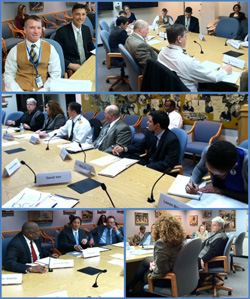Federal Leads Continue Collaborative Efforts
Topics

Our discussions are informed by specifics about relevant programs and policies shared by our respective agencies; in this way we are able to identify potential opportunities for collaboration and coordination at both the Federal and local levels. Toward that end, representatives of the Department of Housing and Urban Development (HUD), Department of Veterans Affairs (VA), and Department of Justice’s Bureau of Prisons (BOP) shared program highlights with the group and fielded questions.
Mr. David Vos, director of HUD’s Housing Opportunities for Persons with AIDS (HOPWA) program, recognized the importance of our group meeting on a regular basis, noting that sharing information across agencies and joint problem solving would result in better outcomes for persons living with HIV/AIDS. He shared that the HOPWA team is currently engaged in an effort to identify model programs among its grantees. Those best practices will be documented and disseminated among all the grantees. Mr. Vos also noted that HUD is pursing a revision to its HOPWA funding formula as recommended in the NHAS. In a guest blog post, he recently shared more details on that activity. Finally, Mr. Vos noted that all of these activities are unfolding amidst broader department-wide efforts to utilize HUD assistance to improve health outcomes and quality of life for beneficiaries and communities.
Dr. Maggie Czarnogorski, the Deputy Director for VA’s HIV/AIDS program, reported that the Strategy has provided a platform for VA’s separately administered homelessness and HIV/AIDS programs to come together and identify ways to collaborate. Similarly, the Strategy has resulted in a heightened examination of how the needs of HIV-positive veterans are being addressed in cross-Departmental partnerships with HUD on services to homeless veterans and with BOP when dealing with incarcerated veterans. In the former program, client data forms have already been modified to now ask about both HIV and Hepatitis C status. In addition, Dr. Czarnogorski reported that she will be providing training on HIV/AIDS for the more than 800 employees in VA’s national homeless program. This training will make staff more aware of specific HIV/AIDS resources that are available to enhance their capacity to address the needs of this population and will undoubtedly make this important community of providers even more aware of the role that housing support can play in achieving the goals of the NHAS.
Mr. Bruce Smith provided an overview of the BOP's process of assessing and providing support for inmates’ medical and non-medical supportive services. He focused particularly on the steps involved in linking HIV infected inmates who are about to be discharged with appropriate housing services and health care in the community. BOP already partners with VA to address the health care needs of incarcerated veterans living with HIV. He reported that BOP was pursuing a closer collaboration with Health Resources and Services Administration’s (HRSA) Bureau of Primary Health Care to facilitate referrals to community health centers for individuals with HIV who may not be eligible for VA or Ryan White Care Act services and are due to be released. He noted that inmates who are HIV-positive receive a 30-day supply of antitetroviral (ARVs) medications upon release. While BOP does not have responsibility for or authority over state- and locally-administered jails, he explained, the agency does attempt to share with those institutions the BOP models, best practices and lessons about caring for inmates with HIV and facilitating their healthy transition back into the community.
Given the range of HIV prevention and care programs administered by HHS, we also invited colleagues from CDC, HRSA’s HIV/AIDS Bureau and the Substance Abuse and Mental Health Services Administration (SAMHSA) to join the discussion. Each shared brief updates with the Federal leads on activities related to housing security for people living with HIV that are underway or in planning stages within their operating divisions.
Mindful of broader national efforts underway related to the Federal Strategic Plan to Prevent and End Homelessness (PDF 3MB), the Federal leads agreed to pursue communication and collaboration with the U.S. Interagency Council on Homelessness to ensure that issues of housing security for people living with HIV are well coordinated in support of the goals of both the NHAS and the homelessness strategy.
Our meeting made it clear that the lead agencies are actively undertaking efforts to specifically address issues of HIV and housing security as well as pursuing interdisciplinary partnerships with other agencies to strengthen their efforts. Efforts, like these, to support people living with HIV who have challenges meeting their basic needs, such as housing, will improve health outcomes for persons living with HIV/AIDS and move us closer toward achieving the vision of the NHAS. This group will continue to address housing security for persons with HIV/AIDS, in addition to other important NHAS issues, in our ongoing efforts to improve collaboration across the Federal government in its response to HIV/AIDS.